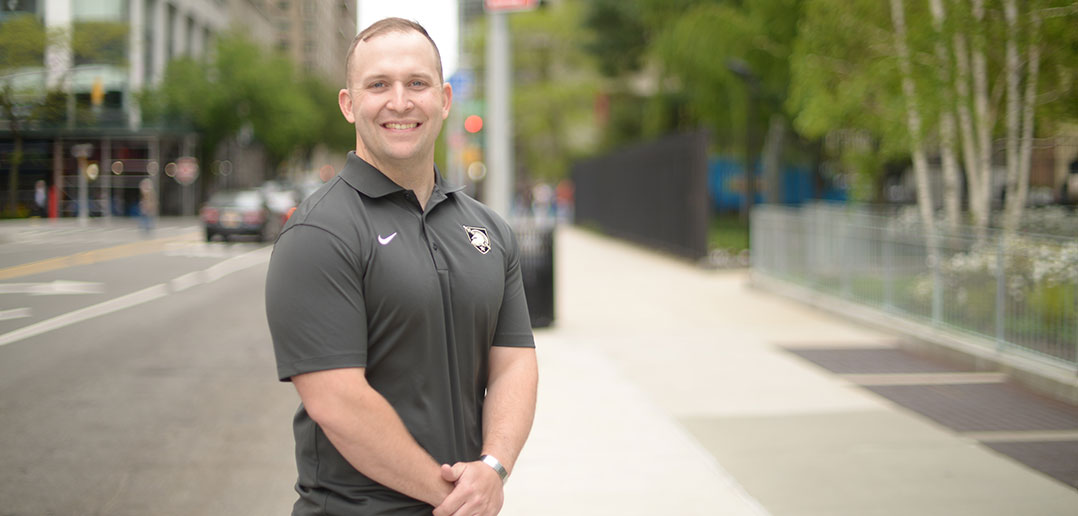Growing up in Colorado Springs, Holloman was immersed in military culture. He graduated from high school in 2010 and enrolled in the New Mexico Military Institute. He went on to earn a B.A. in history at the University of New Mexico, and after enlisting with the Army, he served two tours of duty as a squadron communications officer in Afghanistan and South Korea.
Despite his years in the Army, Holloman never thought he’d make it to West Point. But In 2019, after being promoted to the rank of captain, he was accepted for a teaching position at the famed institution, formally called the United States Military Academy.
And thanks to a partnership between West Point and Fordham’s Graduate School of Education (GSE), Holloway soon found himself doing something else he’d never dreamed of—attending school in New York City.
On May 21, he and fellow Army captain Rob Berchild will graduate with a Master of Science in Education in Curriculum and Teaching from the GSE.
“I was super nervous, because I had been out of college for about seven years, and Army education and civilian education are two very different things. It was pretty intimidating, but it was really good for me to see,” he said, especially given his lack of familiarity with the Northeast.
“I think one of the things that people don’t do enough is see different demographics and enjoy different cultures within the U.S. It’s been a blast, and I’ve learned a ton.”
Fordham and West Point established the partnership in 2016 to give military science instructors like Holloman the tools to teach soldiers how to navigate battlefields that are more complex than ever.
For Holloman, classes such as Creativity and Teaching, which he took with associate professor John Craven, Ph.D., were invaluable. Not only did he gain the skills and perspectives to be a better instructor, but he also found himself with a platform to share what is admittedly a different perspective, having been deployed twice and moved eight times.
“There were times in class where I’d sit there [in class]and people would say, ‘I can’t understand why this is this way.’ And I’d be thinking, ‘Because that’s not how the world works,’” he said, noting that sometimes he got the sense Craven was thinking, “Josh, why don’t you just say it?
Holloman did share his thoughts, and said that he feels the experience “helps the people see the world from a different lens.”
His time at Fordham also taught him to contemplate what he is offering his cadets as in instructor, he said.
“How can I take virtual reality and apply it to the classroom? How can I design that to make it an individualized learning environment for that student? Am I creating an environment for them to thrive, or am I creating an environment that is inhibiting their chance to learn? Am I asking the right questions?” he said.
“That’s what Dr. Craven opened up for us.”
Craven said it was a pleasure to see Holloman, who took several classes with him, go from being somewhat intimidated by a different style of education, in a different area of the country, to adjust, adapt, and ultimately thrive. It’s what GSE hopes to do with all the West Point captains who take the two-hour train ride to Lincoln Center once a week to become the best instructors they can be.
“These captains are taking these young cadets and teaching them leadership skills, communication skills, credible thinking skills and a sense of service to the country,” he said.
Although the civilian world and the military world are very different, Craven said there are a lot more areas of commonality than many realize.
“We’re fighting for social justice and they’re fighting for the country, so we actually share this sense of service to others. That shared connection is formed when we have education majors and teachers and administrators interacting with captains from West Point.”
After graduation, Holloman will return full time to West Point, where he will be an adviser for cadets who are choosing whether they want to pursue a career in military intelligence, cyber security, or signal corps (communications). He will also become a full instructor in the department of military instruction.
He’s grateful both for the degree he’s earned and the fact that being a full-time student brought him closer to his wife Kaysha, who is also earning a master’s in education this year, from Grand Canyon University.
“It was fun for us, because we could actually talk about things when I didn’t understand something. She’d, be like, ‘You know hun, this isn’t the Army, this is how a classroom works. This is how you should look at it,’” he said.
He’s also feeling a bit of disbelief that his life has taken this path.
“A kid from Colorado Springs never thinks they’re going be walking around Manhattan, like in the movies. It’s a pretty awesome gift the Army gave me.”

